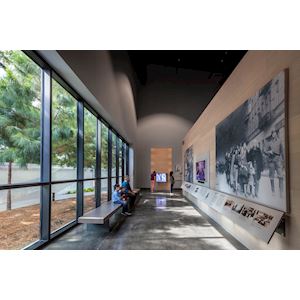
118 - Bearing Witness - Resistance
NARRATOR Resistance to the Nazis took many forms, ranging from hiding religious relics to organizing escapes from ghettos or camps. Small books handmade by prisoners in the camps also represent an act of resistance because the person who made them did so seeking the dignity and comfort that had been denied her. She resisted the Nazis power to diminish her. In an important way, she stood up to them. So… while acts of resistance always require courage, they do not necessarily require physically fighting the enemy. However, some resistance fighters did take up arms. They were known as partisans. Outside the exhibit is a tree-filled garden called “Partisan Forest” which reflects the environment of many armed partisans—the forests. There they lived, hid stolen weapons, organized rescues, and planned acts of sabotage or guerilla warfare as fighting units. They were impossibly outnumbered by the Nazis, but they were committed to standing up to them. Miriam Brysk: "…A lot of young men came out of the ghettos and joined the Partisans and after a while there were actual entire Jewish units with Jewish commands with arms…" NARRATOR Brysk found herself living among partisans in Belorussia. "…They would blow up German trains. They would blow up German munitions. They would be a perpetual thorn in the German's existence … At the age of eight I got my own pistol that I proudly wore at my side and I knew how to use it too…my head was shaved, and I dressed in boy's clothing…" NARRATOR One large Jewish partisan group—hiding in the forest outside Vilna, Lithuania—managed to derail hundreds of trains and kill over 3,000 German soldiers. Other resistance fighters operated out of the cities, such as the heroic fighters of the Warsaw Ghetto uprising. The majority of resistance fighters, however, were not Jewish. Even though they were not the target of the Nazis, they still stood up.


Holocaust Museum Houston
Holocaust Museum Houston is dedicated to educating people about the Holocaust, remembering the 6 million Jews and other innocent victims and honoring the survivors’ legacy. Using the lessons of the Holocaust and other genocides, we teach the dangers of hatred, prejudice, and apathy.
- 5401 Caroline
- Houston United States
- 713-942-8000
- www.hmh.org
